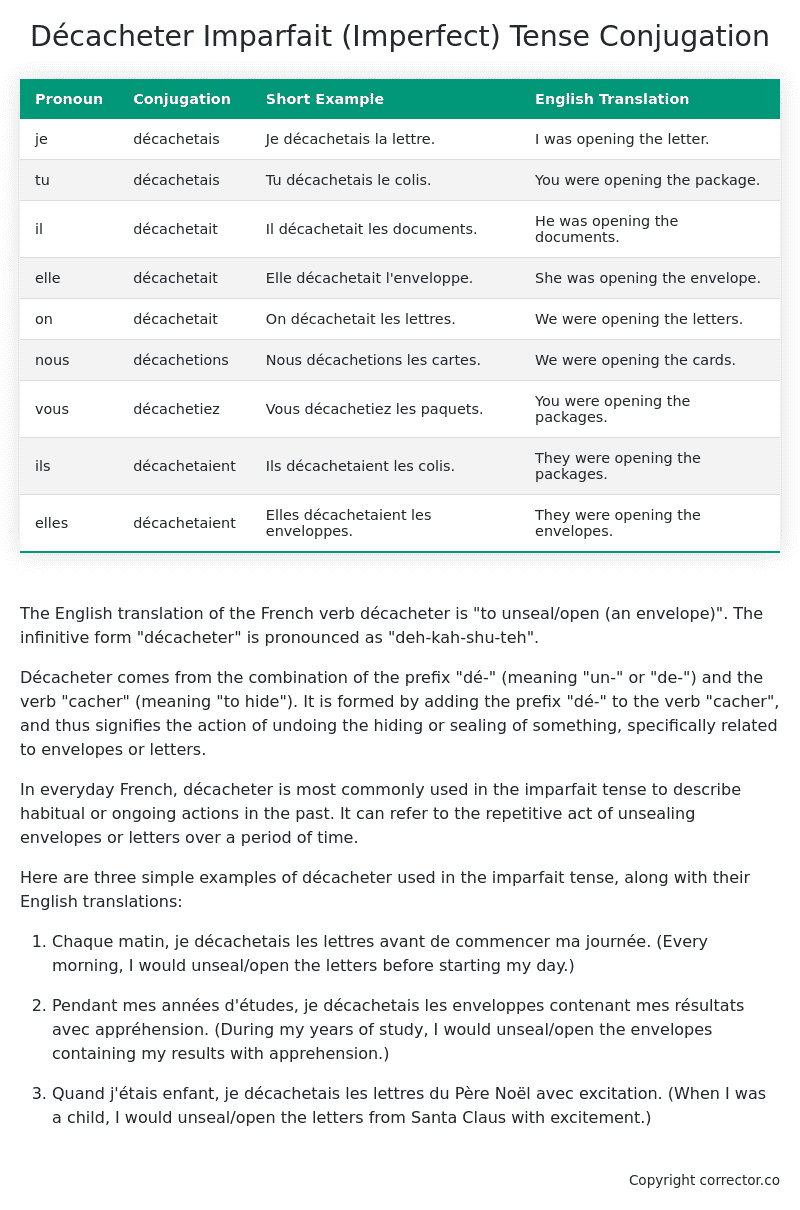Imparfait (Imperfect) Tense Conjugation of the French Verb décacheter
Introduction to the verb décacheter
The English translation of the French verb décacheter is “to unseal/open (an envelope)”. The infinitive form “décacheter” is pronounced as “deh-kah-shu-teh”.
Décacheter comes from the combination of the prefix “dé-” (meaning “un-” or “de-“) and the verb “cacher” (meaning “to hide”). It is formed by adding the prefix “dé-” to the verb “cacher”, and thus signifies the action of undoing the hiding or sealing of something, specifically related to envelopes or letters.
In everyday French, décacheter is most commonly used in the imparfait tense to describe habitual or ongoing actions in the past. It can refer to the repetitive act of unsealing envelopes or letters over a period of time.
Here are three simple examples of décacheter used in the imparfait tense, along with their English translations:
-
Chaque matin, je décachetais les lettres avant de commencer ma journée.
(Every morning, I would unseal/open the letters before starting my day.) -
Pendant mes années d’études, je décachetais les enveloppes contenant mes résultats avec appréhension.
(During my years of study, I would unseal/open the envelopes containing my results with apprehension.) -
Quand j’étais enfant, je décachetais les lettres du Père Noël avec excitation.
(When I was a child, I would unseal/open the letters from Santa Claus with excitement.)
Table of the Imparfait (Imperfect) Tense Conjugation of décacheter
| Pronoun | Conjugation | Short Example | English Translation |
|---|---|---|---|
| je | décachetais | Je décachetais la lettre. | I was opening the letter. |
| tu | décachetais | Tu décachetais le colis. | You were opening the package. |
| il | décachetait | Il décachetait les documents. | He was opening the documents. |
| elle | décachetait | Elle décachetait l’enveloppe. | She was opening the envelope. |
| on | décachetait | On décachetait les lettres. | We were opening the letters. |
| nous | décachetions | Nous décachetions les cartes. | We were opening the cards. |
| vous | décachetiez | Vous décachetiez les paquets. | You were opening the packages. |
| ils | décachetaient | Ils décachetaient les colis. | They were opening the packages. |
| elles | décachetaient | Elles décachetaient les enveloppes. | They were opening the envelopes. |
Other Conjugations for Décacheter.
Le Present (Present Tense) Conjugation of the French Verb décacheter
Imparfait (Imperfect) Tense Conjugation of the French Verb décacheter (You’re reading it right now!)
Passé Simple (Simple Past) Tense Conjugation of the French Verb décacheter
Passé Composé (Present Perfect) Tense Conjugation of the French Verb décacheter
Futur Simple (Simple Future) Tense Conjugation of the French Verb décacheter
Futur Proche (Near Future) Tense Conjugation of the French Verb décacheter
Plus-que-parfait (Pluperfect) Tense Conjugation of the French Verb décacheter
Passé Antérieur (Past Anterior) Tense Conjugation of the French Verb décacheter
Futur Antérieur (Future Anterior) Tense Conjugation of the French Verb décacheter
Subjonctif Présent (Subjunctive Present) Tense Conjugation of the French Verb décacheter
Subjonctif Passé (Subjunctive Past) Tense Conjugation of the French Verb décacheter
Subjonctif Imparfait (Subjunctive Imperfect) Tense Conjugation of the French Verb décacheter
Subjonctif Plus-que-parfait (Subjunctive Pluperfect) Tense Conjugation of the French Verb décacheter
Conditionnel Présent (Conditional Present) Tense Conjugation of the French Verb décacheter
Conditionnel Passé (Conditional Past) Tense Conjugation of the French Verb décacheter
Conditionnel Passé II (Conditional Past II) Tense Conjugation of the French Verb décacheter
L’impératif Présent (Imperative Present) Tense Conjugation of the French Verb décacheter
L’impératif Passé (Imperative Past) Tense Conjugation of the French Verb décacheter
L’infinitif Présent (Infinitive Present) Tense Conjugation of the French Verb décacheter
L’infinitif Passé (Infinitive Past) Tense Conjugation of the French Verb décacheter
Le Participe Présent (Present Participle) Tense Conjugation of the French Verb décacheter
Le Participe Passé (Past Participle) Tense Conjugation of the French Verb décacheter
Struggling with French verbs or the language in general? Why not use our free French Grammar Checker – no registration required!
Get a FREE Download Study Sheet of this Conjugation 🔥
Simply right click the image below, click “save image” and get your free reference for the décacheter imparfait tense conjugation!

Décacheter – About the French Imparfait Tense
NOTE: To take a deep dive into all the French tenses then see our article on Mastering French Tense Conjugation.
Formation of the Imparfait Tense
For regular -er verbs:
For regular -ir verbs
For regular -re verbs
Common Everyday Usage Patterns
Description of Past Habits
Background Information
Mental and Emotional States
It’s employed to express emotions, thoughts, or physical sensations in the past. For example: “J’étais content quand il est arrivé.” (I was happy when he arrived.)
Ongoing Actions
Points to Note About the Imparfait Tense
Passé Composé vs. Imparfait
Conditional
Si Clauses
Narration
I hope you enjoyed this article on the verb décacheter. Still in a learning mood? Check out another TOTALLY random French verb imparfait conjugation!


